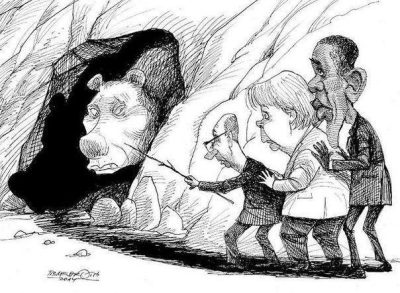The 1991 Dissolution of the USSR: Will Russia Take Decisive Geopolitical Steps Regarding Kosovo?

All Global Research articles can be read in 51 languages by activating the Translate Website button below the author’s name.
To receive Global Research’s Daily Newsletter (selected articles), click here.
Follow us on Instagram and Twitter and subscribe to our Telegram Channel. Feel free to repost and share widely Global Research articles.
***
A peaceful dissolution of the USSR according to the agreement between Mikhail Gorbachev and Ronald Reagan in 1988 in Reykjavik brought a new dimension of global geopolitics in which up to 2008 Russia, as a legal successor state of the USSR, was playing an inferior role in global politics when an American Neocon concept of Pax Americana became the fundamental framework in international relations. Therefore, for instance, Boris Yeltsin’s Russia capitulated in 1995 to the American design regarding an outcome of the USA/EU policy of the destruction of ex-Yugoslavia in November 1995 (the Dayton Agreement) followed by even worse political capitulation in the case of Washington’s Kosovo policy that became ultimately implemented in June 1999 (the Kumanovo Agreement).
Russia in the 1990s was geopolitically humiliated by the USA and its West European clients to such an extent that we can call the period of Boris Yeltsin’s servile policy toward the West a Dark Time in the history of Russian international relations when the main losers became the Serbs who were and still are (since February 2022 together with Russians) extremely demonized by the Western mass-media and academic institutions.[i]
An ideological-political background of Boris Yeltsin’s foreign policy of Russia was Atlanticism – an orientation in foreign policy that stresses the fundamental need to cooperate (at any price) with the West, especially in the area of the politics and economy. In other words, the integration with the West and its economic-political standards became for Boris Yeltsin’s Russia, governed by the Russian Liberals, an order of the day. This trend in Russia’s foreign policy in the 1990s had its roots in the 19th century’s geopolitical and cultural orientation of Russian society by the so-called Russian „Westerners“ who became the opponents to the Russian „Slavophiles“ for whom the ultimate aim of the Russian foreign policy was to create a Pan-Slavonic Commonwealth with the leadership of Russia.
The actual outcome of the Russian Liberals „in the years following Yeltsin’s election was catastrophic as, for instance, Russia’s industrial production dropped by nearly 40%, over 80% of Russians experienced a reduction in their living standards, health care disintegrated, life expectancy fell along with the birth rate, and morale overall collapsed“.[ii]
However, the political influence of the Russian Liberals became drastically weakened by Vladimir Putin’s taking power in Russia from 2000 onward and especially from 2004. A new global course of Russia’s foreign policy after 2004 became directed toward the creation of a multipolar world but not a unipolar Pax Americana one as the American Neocons wanted. Therefore, the Caucasus, Ukraine, and Syria became currently directly exposed to the Russian-American geopolitical struggle while Kosovo is up to now still left to the exclusive US sphere of interest.
Nevertheless, after 2022−? the special military operation in East Ukraine (Russia Minor) by Moscow, it can be expected in the nearest future that post-Yeltsin’s Russia will take decisive geopolitical steps concerning Kosovo as from the year 2000 the Russian exterior policy is constantly becoming more and more imbued with the neo-Slavophile geopolitical orientation advocated by Aleksandar Solzhenitsyn (1918−2008) as a part of a more global Eurasian geopolitical course of the post-Yeltsin’s Russian Federation supported by many Russian Slavophile intellectuals like a philosopher Aleksandar Dugin.
Ivan L. Solonevich, probably, gave one of the best explanations of Russia’s geopolitical situation and peculiarity in comparison to those of the USA and the UK focusing his research on the comparative analysis of geography, climate, and levels of individual freedoms between these countries:
„The American liberties, as well as American wealth are determined by American geography. Our [Russia’s] freedom and our wealth are determined by Russian geography. Thus, we’ll never have the same freedoms as the British and Americans have, because their security is guaranteed by the seas and oceans, but ours could only be guaranteed by military conscription“.[iii]
*
Note to readers: Please click the share buttons above. Follow us on Instagram and Twitter and subscribe to our Telegram Channel. Feel free to repost and share widely Global Research articles.
Dr. Vladislav B. Sotirović is a former university professor in Vilnius, Lithuania. He is a Research Fellow at the Center for Geostrategic Studies. He is a regular contributor to Global Research.
[i] As a very example of such moral, cultural and civilizational demonization of the Serbs by the Western academic writings is [John Hagan, Justice in the Balkans: Prosecuting War Crimes in The Hague Tribunal, Chicago−London: The University of Chicago Press, 2003].
[ii] John Baylis, Steve Smith (eds.), The Globalization of World Politics: An Introduction to International Relations, Second edition, New York: Oxford University Press, 2001, 124.
[iii] Irina Isakova, Russian Governance in the Twenty-First Century: Geo-strategy, Geopolitics and Governance, London−New York: Frank Cass, 2005, 12.
Featured image is from the author

